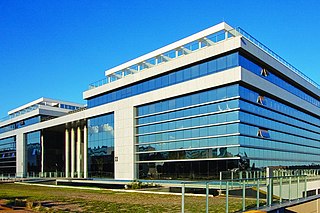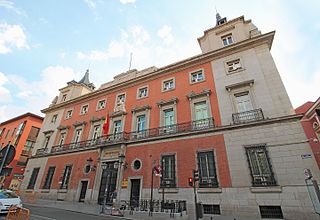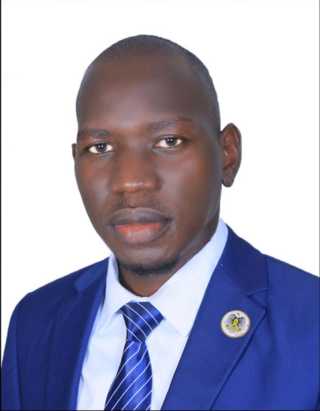Related Research Articles

The Government of India is the federal executive authority of the Republic of India, a federal republic located in South Asia, consisting of 28 states and eight union territories. The government is led by the prime minister who exercises the most executive power and selects all the other ministers. The country has been governed by a NDA-led government since 2014. The prime minister and their senior ministers belong to the Union Council of Ministers—its executive decision-making committee being the cabinet.

The Supreme Court of Korea is the highest ordinary court in the judicial branch of South Korea, seated in Seocho, Seoul. Established under Chapter 5 of the Constitution of South Korea, the Court has ultimate and comprehensive jurisdiction over all cases except those cases falling under the jurisdiction of the Constitutional Court of Korea. It consists of fourteen Justices, including the Chief Justice of the Supreme Court of Korea. The Supreme Court is at the top of the hierarchy of all ordinary courts in South Korea, and traditionally represented the conventional judiciary of South Korea. The Supreme Court has equivalent status as one of the two highest courts in South Korea. The other is the Constitutional Court of Korea.
Siye Abraha Hagos (also Seeye Abraha Hagos) (Tigrinya: ስዬ አብርሃ ሓጐስ, siyә abräha; born 12 June 1955) is an Ethiopian politician who served as Ethiopian Minister of Defense from 1991 to 1995. He was a top official of Tigray People's Liberation Front (TPLF) and Ethiopian People's Revolutionary Democratic Front executive committees until 2002. Since 2013, he has been working as Security Sector Reform Advisor for United Nations Development Programme in Liberia.
Recent decades have seen a surge in the birth of "supraterritorial institutions and associations", that have been gathered by their enactment of common law and practices. European Union's regional expansion into Southeastern Europe to include Romania is one such example. The community of European states has enacted treaties that have allowed them to unite politically and economically.

The chief justice of Ghana is the highest-ranking judge of the Supreme Court of Ghana. The chief justice is also the head of the Judiciary of Ghana and is responsible for its administration and supervision. In order of state precedence, the chief justice is the fourth highest official in Ghana.

The National Council of Justice (CNJ) is an administrative and oversight organ of the Brazilian Judiciary created by constitutional amendment in 2004 as a part of judicial reform. Among its responsibilities are ensuring that the judicial system remains autonomous, conducting disciplinary proceedings against members of the Judiciary, and compiling and publishing statistics on the Brazilian court system. The Council has nationwide jurisdiction over all courts except the Supreme Federal Court, but makes no rulings on cases and does not review judgements of other courts. Its fifteen members are chosen by the Supreme Federal Court for two-year terms.

The judiciary of Malta interprets and applies the laws of Malta, to ensure equal justice under law, and to provide a mechanism for dispute resolution. The legal system of Malta is based partially on English law and partly on Continental law, whilst also being subject to European Union law.
Justice James Ogoola is the former Principal Judge of the High Court of Uganda and a Justice of the COMESA Court of Justice in Lusaka, Zambia. He is the also the former chairperson of the Judicial Service Commission of Uganda. Previously, he served as the chairman of the commission of inquiry into the mismanagement of The Global Fund to Fight AIDS, Tuberculosis and Malaria. He was an Acting Justice of the Supreme Court of Uganda. He is a member of The East African Court of Justice.
Judicial reform is the complete or partial political reform of a country's judiciary. Judicial reform can be connected to a law reform, constitutional amendment, prison reform, police reform or part of wider reform of the country's political system.

The Ministry of Justice (MJUS) was the department of the Government of Spain responsible for preparing and carrying out the government policy in order to bring the legal system off, specially in criminal, civil, commercial and procedural law affairs, supporting the Administration of Justice and the legal and international cooperation.

Joyce Aluoch is a Kenyan lawyer who served as Judge of the International Criminal Court from 2009 until 2018. She is a former judge of the High Court of Kenya. In addition to her career as a judge, she was the First Chairperson of the Committee of African Union Experts on the Rights and Welfare of the Child and the Vice-Chairperson of the United Nations Committee on the Rights of the Child from 2003 to 2009. She has also served as the inaugural head of the family division of the Kenyan High Court and a member of the Court of Appeal.

The Cabinet of South Sudan is the Executive Branch of the Government of South Sudan. The Cabinet members are appointed by the President and report to the President.
Michael Makuei Lueth is a South Sudanese politician. He is the current Information, Communication, Technology, and Postal Services Minister in the Revitalised Transitional Government of National Unity (RTGoNU). He is also the current Government Spokesperson.
Ajonye Perpetua Paya is a South Sudanese constitutional lawyer, judge and human rights activist. Until 2013 she was a first class justice in the South Sudan judiciary. She assisted in drafting the 2005 interim constitution of Sudan. She served in the cabinet of Central Equatoria State in 2011, then in the cabinet of President Salva Kiir Mayardit, who dismissed her in May 2013. Since then she has held leadership positions in the South Sudan Law Society and has often spoken on civil rights issues including women's rights and gender-based violence. In 2023 she headed the Secretariat of the Judicial Reform Committee (JRC) of South Sudan.
The South Sudan Ministry of Health is a national ministry in the current Revitalised Transitional Government of National Unity (RTGoNU) in the Republic of South Sudan.

A series of political agreements among Sudanese political and military forces for a democratic transition in Sudan began in July 2019. Omar al-Bashir overthrew the democratically elected government of Sadiq al-Mahdi in 1989 and was himself overthrown in the 2019 Sudanese coup d'état, in which he was replaced by the Transitional Military Council (TMC) after months of sustained street protests. Following further protests and the 3 June Khartoum massacre, TMC and the Forces of Freedom and Change (FFC) alliance agreed on 5 July 2019 to a 39-month transition process to return to democracy, including the creation of executive, legislative and judicial institutions and procedures.

The judiciary of South Korea is the judicial branch (사법부) of South Korean central government, established by Chapter 5 and 6 of the Constitution of South Korea.

Paulino Lukudu Obede, is a South Sudanese politician. He is currently the Deputy Governor for Central Equatoria State in the Revitalized Transitional Government of National Unity (RTGoNU) as of 2024. Paulino is one of the youngest South Sudanese to be appointed to a gubernatorial post at 34. Lukudu has previously served as Minister for Information for Central Equatoria, a member of the South Sudan National Dialogue, and a member of the Transitional National Legislature which is equivalent to Senate in other countries. He served as an MP among the appointees of the Other Political Parties on 17 September 2021, and later in 2023 became the Chief Whip of the Other Political Parties (OPP). Chief Whip is the Chairperson of the Party's Parliamentary Caucus. until his elevation to the position of Deputy Governor.
Alex Latio Elia is a South Sudanese politician. Since 2023, Elia has served as the Minister of Animal Resources Fisheries and of Tourism for Central Equatoria State in the Transitional Government of National Unity (RTGoNU).
References
- 1 2 Evelyn Edroma (30 August 2022), South Sudan's Judicial Reform Committee Heralds Hope for the Justice Sector, UNDP, retrieved 2023-09-25
- ↑ LADY JUSTICE JOYCE ALUOCH APPOINTED MEMBER OF THE JUDICIAL REFORM COMMITTEE FOR SOUTH SUDAN, African Arbitration Association, 24 March 2023, retrieved 2023-10-04
- ↑ About Us, JRC, retrieved 2023-10-04
- ↑ Inauguration of JRC, key milestone in the implementation of the R-ARCSS, Reconstituted Joint Monitoring and Evaluation Commission (RJMEC), 28 July 2022, retrieved 2023-01-02
- ↑ Final Minutes of the 27th meeting of the RJMEC, RJMEC, 2 March 2023, p. 3, retrieved 2023-09-25
- 1 2 Structure, JRC, retrieved 2023-10-04
- ↑ Structure, JRC, retrieved 2023-10-04
- ↑ Judicial Reform Committee holds consultations, Radio Tamazuj, 4 July 2023, retrieved 2023-10-04
- ↑ Third Workshop for the Judicial Reform Committee of South Sudan, Max Planck Foundation, 12 May 2023, retrieved 2023-10-04